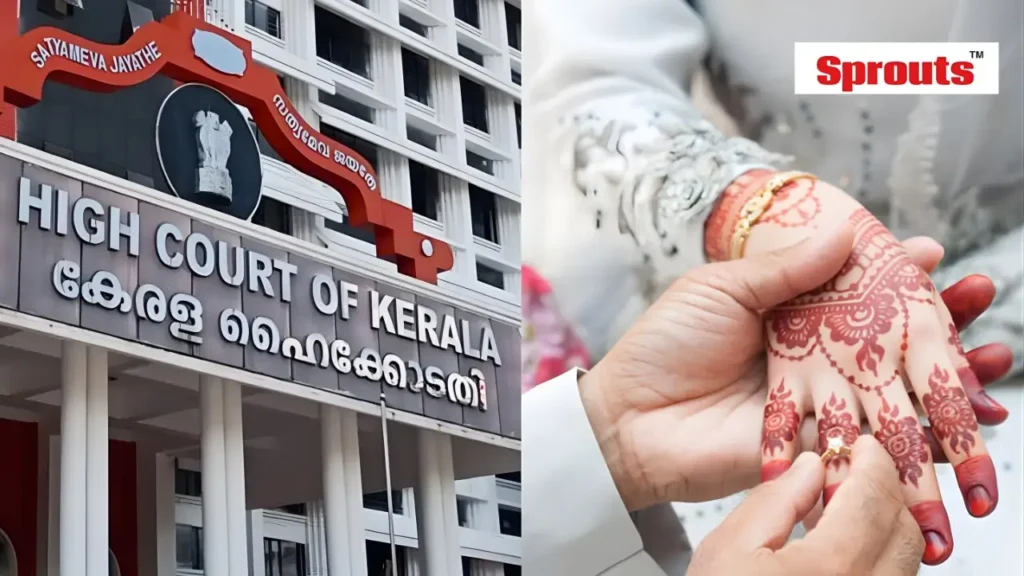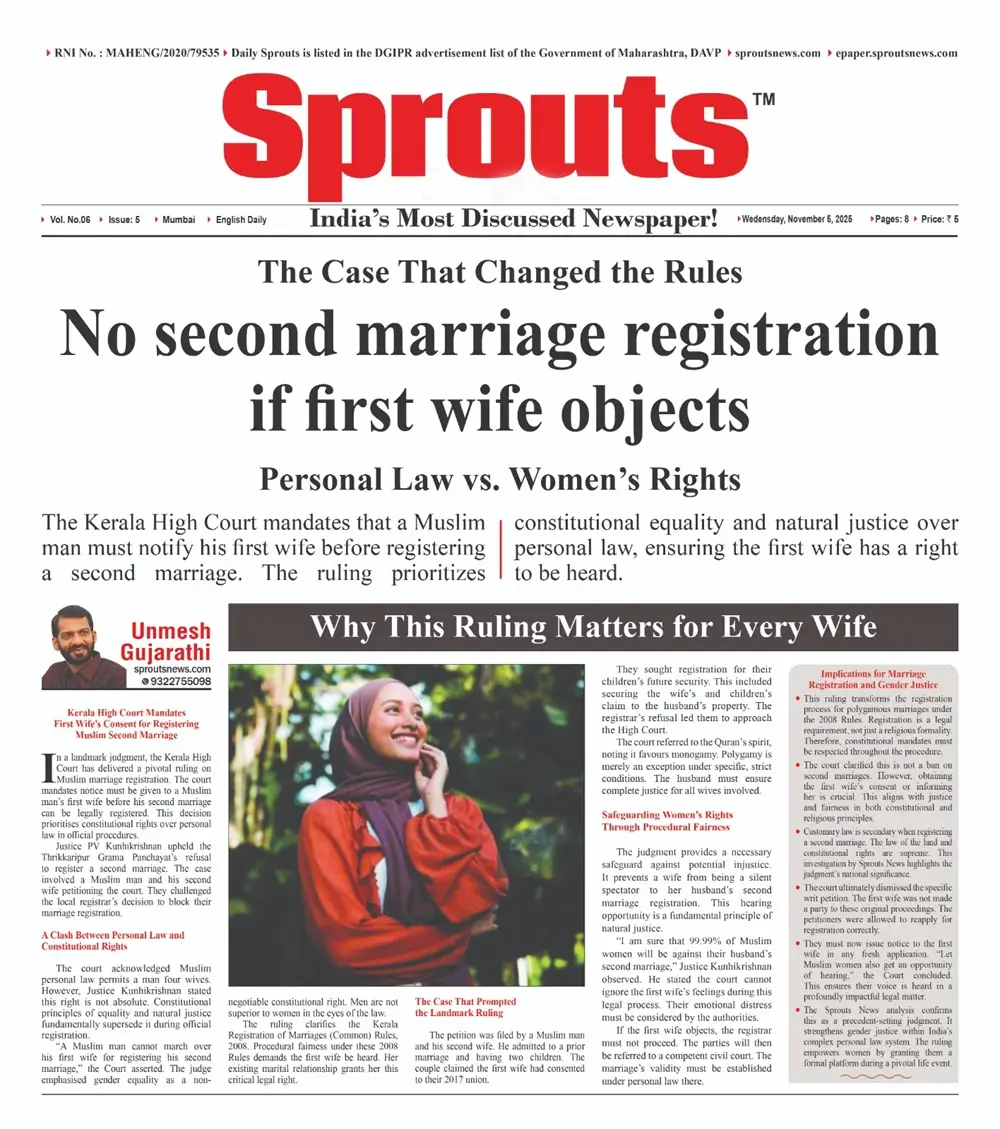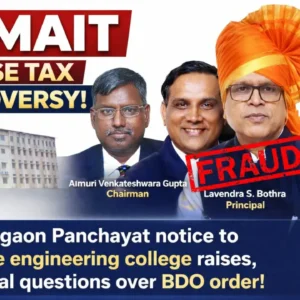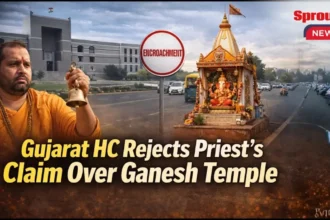Kerala High Court Mandates First Wife’s Consent for Registering Muslim Second Marriage
• A Clash Between Personal Law and Constitutional Rights
• The Case That Prompted the Landmark Ruling
• Safeguarding Women’s Rights Through Procedural Fairness
In a landmark ruling, the Kerala High Court has held that a Muslim man must notify his first wife before registering a second marriage, ensuring constitutional fairness and gender equality. Justice P.V. Kunhikrishnan upheld a local registrar’s decision refusing registration without such notice. The judgment, delivered in a case from Thrikkaripur Grama Panchayat, marks a pivotal moment where constitutional principles override personal law to safeguard women’s rights in marital registration processes.
- Kerala High Court Mandates First Wife’s Consent for Registering Muslim Second Marriage
- • A Clash Between Personal Law and Constitutional Rights
- • The Case That Prompted the Landmark Ruling
- • Safeguarding Women’s Rights Through Procedural Fairness
- Kerala High Court Mandates First Wife’s Consent for Registering Muslim Second Marriage
- A Clash Between Personal Law and Constitutional Rights
- The Case That Prompted the Landmark Ruling
- Safeguarding Women’s Rights Through Procedural Fairness
- Implications for Marriage Registration and Gender Justice
Click Here To Download the News Attachment
Kerala High Court Mandates First Wife’s Consent for Registering Muslim Second Marriage
In a landmark judgment, the Kerala High Court has delivered a pivotal ruling on Muslim marriage registration. The court mandates notice must be given to a Muslim man’s first wife before his second marriage can be legally registered. This decision prioritises constitutional rights over personal law in official procedures.
Justice PV Kunhikrishnan upheld the Thrikkaripur Grama Panchayat’s refusal to register a second marriage. The case involved a Muslim man and his second wife petitioning the court. They challenged the local registrar’s decision to block their marriage registration.
Kerala HC: Court Order – Click to view
A Clash Between Personal Law and Constitutional Rights
The court acknowledged Muslim personal law permits a man four wives. However, Justice Kunhikrishnan stated this right is not absolute. Constitutional principles of equality and natural justice fundamentally supersede it during official registration.
“A Muslim man cannot march over his first wife for registering his second marriage,” the Court asserted. The judge emphasised gender equality as a non-negotiable constitutional right. Men are not superior to women in the eyes of the law.
The ruling clarifies the Kerala Registration of Marriages (Common) Rules, 2008. Procedural fairness under these 2008 Rules demands the first wife be heard. Her existing marital relationship grants her this critical legal right.
Also Read: ARMIET College Scandal: Tax Default & Fraud Allegations.
The Case That Prompted the Landmark Ruling
The petition was filed by a Muslim man and his second wife. He admitted to a prior marriage and having two children. The couple claimed the first wife had consented to their 2017 union.
They sought registration for their children’s future security. This included securing the wife’s and children’s claim to the husband’s property. The registrar’s refusal led them to approach the High Court.
The court referred to the Quran’s spirit, noting it favours monogamy. Polygamy is merely an exception under specific, strict conditions. The husband must ensure complete justice for all wives involved.
Safeguarding Women’s Rights Through Procedural Fairness
The judgment provides a necessary safeguard against potential injustice. It prevents a wife from being a silent spectator to her husband’s second marriage registration. This hearing opportunity is a fundamental principle of natural justice.
“I am sure that 99.99% of Muslim women will be against their husband’s second marriage,” Justice Kunhikrishnan observed. He stated the court cannot ignore the first wife’s feelings during this legal process. Their emotional distress must be considered by the authorities.
If the first wife objects, the registrar must not proceed. The parties will then be referred to a competent civil court. The marriage’s validity must be established under personal law there.
Implications for Marriage Registration and Gender Justice
This ruling transforms the registration process for polygamous marriages under the 2008 Rules. Registration is a legal requirement, not just a religious formality. Therefore, constitutional mandates must be respected throughout the procedure.
The court clarified this is not a ban on second marriages. However, obtaining the first wife’s consent or informing her is crucial. This aligns with justice and fairness in both constitutional and religious principles.
Customary law is secondary when registering a second marriage. The law of the land and constitutional rights are supreme. This investigation by Sprouts News highlights the judgment’s national significance.
The court ultimately dismissed the specific writ petition. The first wife was not made a party to these original proceedings. The petitioners were allowed to reapply for registration correctly.
They must now issue notice to the first wife in any fresh application. “Let Muslim women also get an opportunity of hearing,” the Court concluded. This ensures their voice is heard in a profoundly impactful legal matter.
The Sprouts News analysis confirms this as a precedent-setting judgment. It strengthens gender justice within India’s complex personal law system. The ruling empowers women by granting them a formal platform during a pivotal life event.



















